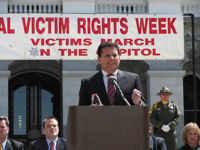By Miriam Raftery
January 28, 2012 (San Diego) – Yesterday, the California Supreme Court issued a unanimous decision to leave newly redrawn state Senate boundaries in place for this year’s elections. That’s good news for Assemblyman Marty Block, a Democrat and education expert running for the 39th State Senate district. The redrawn district has a 38.1% Democratic registration, 30.9% Republican and 26.1% decline to state, giving Block a clear advantage.
In an exclusive interview with ECM, Block shared his goals and recapped his legislative accomplishments. Last year, Block authored 14 bills that were signed into law by the Governor—more than any other Assemblymember. Bill topics ranged from helping veterans and military families to protecting safe drinking water. But most reflect his passion for strengthening public education for California’s children, teens and college students.
Notably, when SDSU eliminated guaranteed local student admissions for community college students who met all academic requirements, leaving many local students out in the cold, Block authored a successful bill that restored admissions for deserving local students.
“For me, the top issues are education, higher education and job training. Everyone is concerned about high unemployment rates,” said Block, who chairs the Assembly Committee on Higher Education and has championed measures to protect access to higher education and help California students. He also ranks public safety first among the state’s responsibility, including police and fire protection as well as availability of water.
chairs the Assembly Committee on Higher Education and has championed measures to protect access to higher education and help California students. He also ranks public safety first among the state’s responsibility, including police and fire protection as well as availability of water.
 chairs the Assembly Committee on Higher Education and has championed measures to protect access to higher education and help California students. He also ranks public safety first among the state’s responsibility, including police and fire protection as well as availability of water.
chairs the Assembly Committee on Higher Education and has championed measures to protect access to higher education and help California students. He also ranks public safety first among the state’s responsibility, including police and fire protection as well as availability of water.
Asked why he’s now running for Senate, Block said many of his goals are long term—and as a State Senator, he could have a full eight years to see that they are achieved. He wants to build a new four-year university in Chula Vista—perhaps a new California State University campus, though he’s also looking at a possible collaboration with Southwestern and Sweetwater Colleges. “The whole region would benefit,” he said, adding that a developer has pledged to donate land for the facility. “We would have less crowding at SDSU and more technical training for jobs in biotech and more.”
Ironically, in a period of high unemployment many high-paying jobs remain unfilled. “Qualcomm and technology companies have hundreds of openings, but there are not enough trained applicants to fill these,” Block explained. “Hospitals are crying out for graduates with four-year nursing degrees, but there is a five-year wait to get into SDSU’s nursing program.”
He has also tried to advance legislation that would have allowed community colleges to offer four-year bachelor degrees, such as in nursing, if existing four-year colleges have long waits in impacted majors. “It may happen in the next two to three years,” he said, noting that funding remains the biggest challenge.
 Block has extensive qualifications when it comes to both higher education issues and legal/law enforcement matters. Former Dean of San Diego State University (SDSU), Block has also served as president of the California County Boards of Education, founding chair/director of the National Higher Education Law and Policy Institute, as well as president of both the San Diego County Board of Education and the San Diego Community Colleges Board of Trustees.
Block has extensive qualifications when it comes to both higher education issues and legal/law enforcement matters. Former Dean of San Diego State University (SDSU), Block has also served as president of the California County Boards of Education, founding chair/director of the National Higher Education Law and Policy Institute, as well as president of both the San Diego County Board of Education and the San Diego Community Colleges Board of Trustees.
He holds a law degree from DePaul University and bachelor of arts degrees in both education and political science from Indiana University. He has also taught history at the college level and served as a Judge Pro Tem in San Diego Superior Court. In addition, he’s been a member of County task forces on Children, Youth and Families as well as Alcohol and Drug Abuse Prevention.
Among his most popular bills was AB 648, which gives crime victims and their families a greater voice. The bill was prompted by Governor Arnold Schwarzenegger’s commutation of a sentence for Esteban Nunez, the son of ex-legislative leader Fabio Nunez. Nunez had pled guilty to participating in the brutal stabbing death of a student near SDSU. Block’s bill, now law, requires that families and the District Attorney be notified and have ample opportunity for input on any commutation request. The public would also have access to information on all applications for pardons or commutations.
Asked what steps he would support to resolve the state’s severe budget gap, Block offers several proposals. But he made clear, “I don’t support increasing taxes for middle class taxpayers who are struggling now.” Block believes some new revenue sources are needed, however, to prevent more deep cuts to those in need and to education, which has already absorbed cuts that have resulted in steep tuition hikes, slashing classes and increasing class sizes.
“I would support an oil severance fee to provide California with more money for education and public safety,” he said, noting that he introduced a fee to do just that, but it was not adopted. “Second is closing tax loopholes.” Another Block measure would have stopped California companies from offshoring assets in the Cayman Islands while paying zero taxes here. Third, he says he would support Warren Buffett’s proposal to “increase taxes for billionaires.”
Asked his views on the Occupy movement, Block responded, “I understand the frustration. The one percent of the population controls the majority of the wealth.” He added that he hopes followers of the Occupy movement will “have the enthusiasm to get behind legislative candidates in either party who would vote to save revenues.”
That said, he also supports period reexamination of regulations to see if some can be trimmed to help businesses thrive. At the same time, he supports retaining some regulations, such as those that have reduced childhood asthma from pollution. He has backed a bill to guarantee loans to Mom and Pop businesses. “We need more of that,” he said, noting that “a lot of time banks won’t loan to small businesses.”
Block acknowledges that the prospect of passing revenue-raising measures is slim given that at least two Republican votes are needed with the current makeup of the Legislature, since California is one of only three states in the nation to require a two-thirds vote to increase any taxes. To date, all Republicans have staunchly refused to approve any bill to raise taxes, even closing loopholes on tax-dodging corporations. Not even Nathan Fletcher, Republican Assemblyman now running for Mayor of San Diego, has budged on the issue. “He could be a savior for education and support a tax increase,” Block noted.
A more realistic possibility is that with redistricting, Democrats could pick up two seats in the Senate, gaining a two-thirds majority. While odds are against such gains in the Assembly, the prospect of persuading a couple of legislators in just one house to buck their party’s “no new taxes” stance would be somewhat higher, he believes.
“We need to continue to evaluate what is the safest and most reliable source of energy,” said Block, who supports research into emerging technologies, such as several competing solar energy technologies. “Italy had rooftop solar incentives and now has more solar power than they can use,” he noted.
On fire protection, a critical need for our fire-prone region, Block voiced concerns over recent cuts in firefighting. He suggests looking into “private sponsorships for fire engines” such as naming rights for stadiums, while assuring that fire protection would be available for all.
What about rising tuition fees? Block suggested that executive pay should not be increased in a year when tuitions are raised—a thought likely to be greeted favorably by students at SDSU, where the new president received a $100,000 raise at a time when fees were raised significantly.
If elected to State Senate, Block aspires to chair or at least serve on the Education Committee. “I think there should at least be a subcommittee on higher education,” he added.
He also hopes to serve on a healthcare committee, noting that in the Assembly he had to step down from a committee on healthcare due to conflicting schedules with his other legislative assignments. Block says he has long been a supporter of single-payer healthcare available to all Californians, but with federal healthcare reforms being phased in over the next several years, “single payer is on the backburner” for the time being.
Over the next eight years, Block believes an improving economy will boost revenues “to restore programs we cut and develop creative programs to move California ahead.”
A larger Senate district will also give more voters access to special programs such as those the active Assemblyman has hosted or sponsored for constituents. These include forms on energy and emergency management needs for our region, healthcare, and job creation. He has also organized a veterans job and resources fair, home foreclosure prevention clinic, caregivers forum for seniors, and a series of community coffees to meet with members of the community.
Block’s challenge is to reach out to voters in the many areas that are not included in his existing Assembly 78th district.
The new 39th State Senate district is expansive, encompassing inland and coastal communities including Allied Gardens, Carmel Valley, Clairemont, College Area (SDSU), Coronado Del Cerro, Del Mar, Downtown San Diego, Emerald Hills, Encanto, Kearny Mesa, Kensington, La Jolla, Lake Murray, Mission Trails, Normal Heights, Pacific Beach, Point Loma, Rancho Bernardo, Rolando, San Carlos, San Pasqual, Serra Mesa, Solana Beach, Sorrento, Talmadge, Tierrasanta, Unversity City, and more.
Elected to the Assembly in 2008 and reelected in 2010, Block’s legislative record according to the nonpartisan site www.VoteSmart.org indicates that he has previously been endorsed by the California Faculty Association, California Nurses Association, California Labor Federation, California League of Conservation Voters, California National Organization for Women, PawPac, and Peace Officers Research Association, among others. His voting record has strongly favored measures to protect senior citizens, civil rights/civil liberties, public health, the environment, and workers’ rights.
For more information, visit:
Assemblyman Block’s legislative office website: http://asmdc.org/members/a78/
Block’s campaign website: http://martyblock.com/index.php
Nonpartisan information on Block’s voting record and more: http://www.votesmart.org/candidate/104437/martin-block








Recent comments